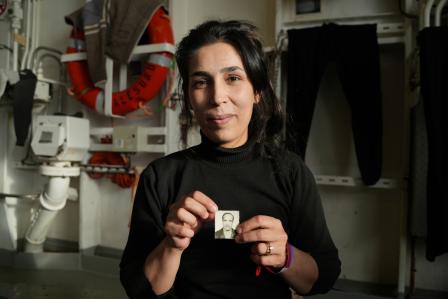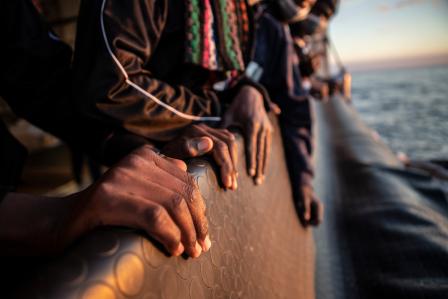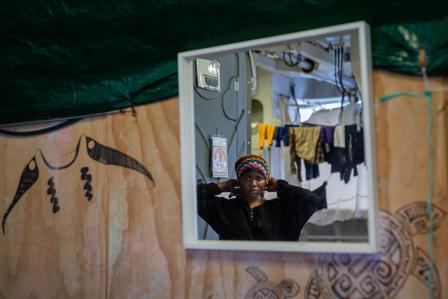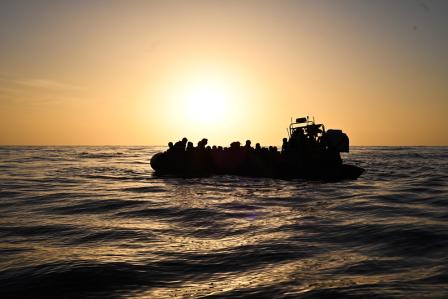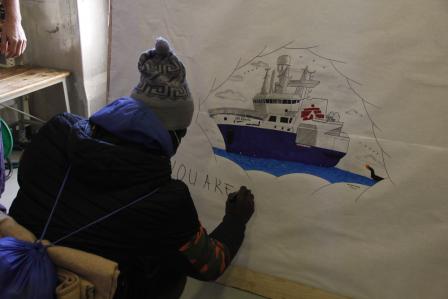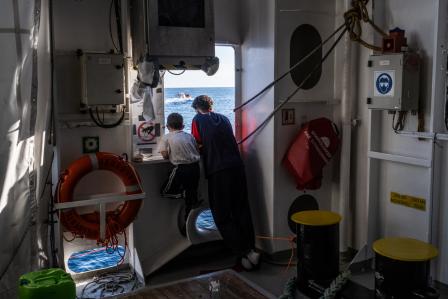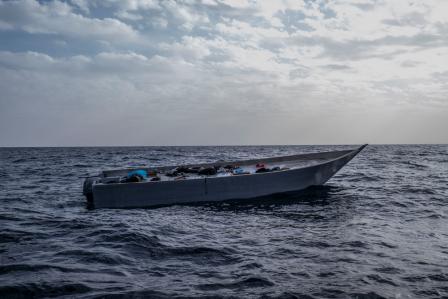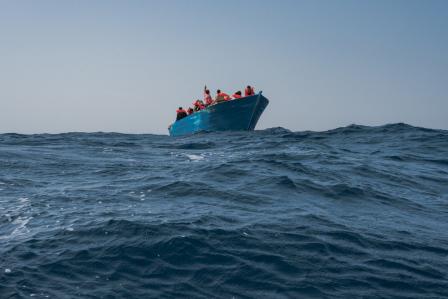Mediterranean Sea: 111 rescued people waiting for a place of safety
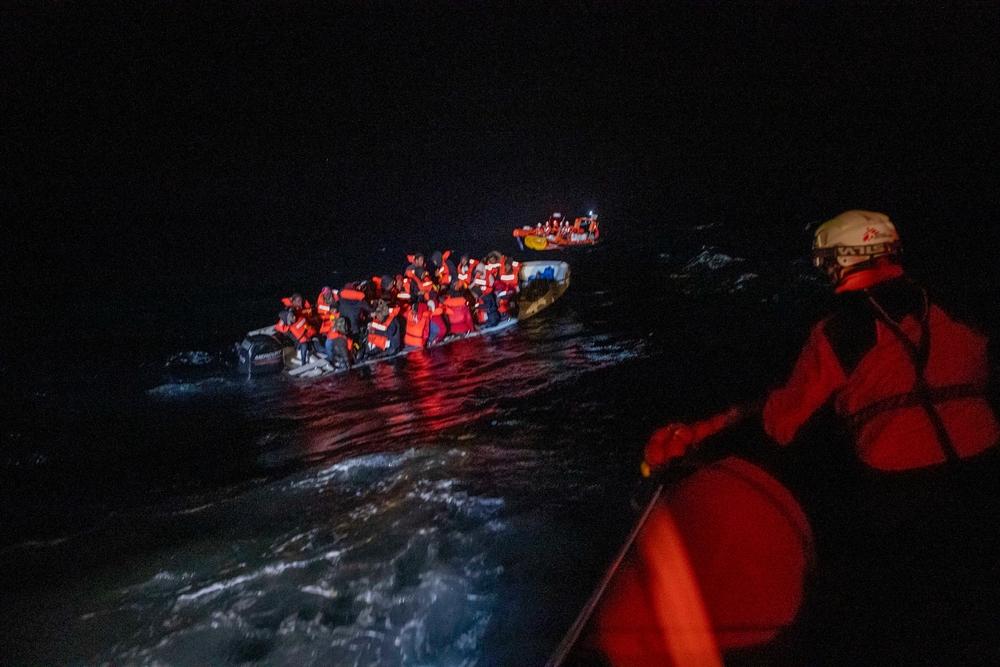
Geo Barents responded to an alert from Alarm Phone for a boat in distress and headed towards its location. Finally, 31 people were rescued around 23.40 and among them there was a pregnant woman. Mediterranean Sea, March 2022. © Anna Pantelia/MSF
All 111 survivors on the Geo Barents need to disembark in a safe place as soon as possible. Many recount that they have attempted the sea-crossing multiple times only to be intercepted by the Libyan Coastguard and taken to detention centers, where they experienced extreme violence, including sexual abuse, and ill-treatment.
On 20 February, the Geo Barents departed the Sicilian coast for the Libyan Search and Rescue (SAR) zone after a one-week quarantine period requested by the Italian authorities due to the presence of some COVID positive cases among the Doctors Without Borders / Médecins Sans Frontières (MSF) team and the maritime crew.
For several days, the rough weather in the Mediterranean Sea discouraged most departures from the Libyan and Tunisian coasts.
The first alert of a boat in distress arrived in the very early hours of 26 February. After a search overnight, the Geo Barents arrived close to the last known position only to find an empty rubber boat. The 105 people reported to be on board were most likely intercepted and returned to Libya.
Another alert, 13 nautical miles southeast of the Geo Barents position, arrived from Alarm Phone in the early morning of 5 March, with in good weather conditions. The Geo Barents immediately changed course towards the indicated location, and the team spotted an overcrowded rubber boat drifting with 80 people on board.
After nearly ten hours at sea, all the survivors, who said to have left the Libyan coast the night before, were rescued and safely brought aboard the Geo Barents to receive primary assistance. After spending so many hours soaked in salty water mixed with fuel, seven of them needed to be treated for fuel burns.
The second rescue took place on the night of 6 March, amid darkness, strong wind and waves. After six hours of searching, the Geo Barents finally reached a highly unstable fiberglass boat in distress with 31 terrified people onboard.
"It was the most difficult rescue I've ever done since I started doing search and rescue in 2017." The boat was already taking water when we found it at 12 a.m. in the dark,” explains Javier Filgueira Guimerá, one of the Doctors Without Borders SAR technicians on the scene. “While we were still bringing people onto our fast rescue boats, the fiberglass boat capsized. They were all thrown into the cold water, including a pregnant woman. It was a life-or-death situation, but we were able to rescue all 31 people".
All the survivors were brought to safety onto the Geo Barents, many presenting fuel intoxications and symptoms of hypothermia.
“We spent almost thirty hours at sea. We were stressed, scared, people got sick, we had a pregnant woman and we didn’t know what to do. The boat flipped and people began to drown. It was scary”, says Aman* (the name has been changed), an Eritrean survivor of the shipwreck.
This time, we were able to rescue everyone on that sinking boat, but what if we had arrived a few hours later? Another silent tragedy would have occurred at sea, and more lives would have been lost as a result of the European governments' withdrawal from search and rescue operations in the Central Mediterranean. While European member states invest in deterrence policies and borders militarization, people are left to drown at sea.Caroline Willemen, Project Coordinator
All 111 survivors on the Geo Barents need to disembark in a safe place as soon as possible. Many recount that they have attempted the sea-crossing multiple times only to be intercepted by the Libyan Coastguard and taken to detention centers, where they experienced extreme violence, including sexual abuse, and ill-treatment.
52 are minor, the youngest of whom is four months old. 45 (ninety per cent) of the minors on board travelled alone, and many told that they have first- to second-degree family members in Europe with whom they would like to reunite.
There are also ten women, two of them pregnant. One of the women presents a severe traumatic injury of the right leg and needs specialist care.
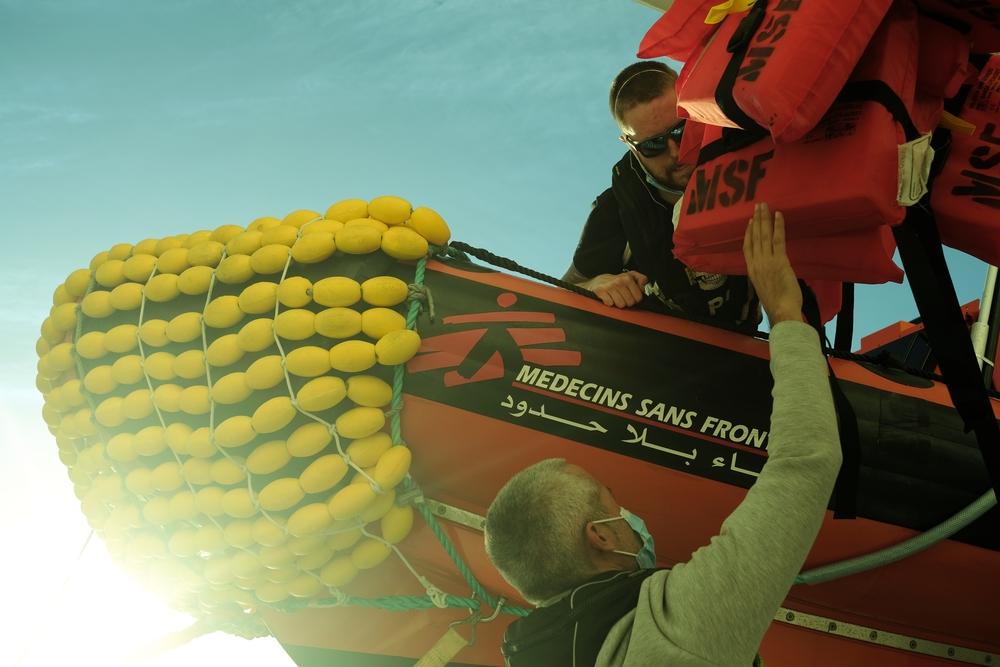
After securing the rescue RHIB on board the Geo Barents, an Doctors Without Borders crew member passes lifejackets to a deck hand. Sicily, February 2022. © Kenny Karpov
Many of the people on board have symptoms of severe psychological distress such as traumatic flashbacks and generalized distress, anxious overthinking, sleeping problems because of the multiple traumatizing events they experienced throughout their journey.
So far, Malta and Italy have denied all the requests for a place of safety to disembark, despite informing the competent authorities about the vulnerable condition and medical needs of many survivors on the Geo Barents.
The Doctors Without Borders teams on board are doing their best to provide medical and psychological support to all the 111 survivors, but these people cannot wait any longer on the vessel. They all need to reach a place to disembark in safety and receive all the assistance they need.
